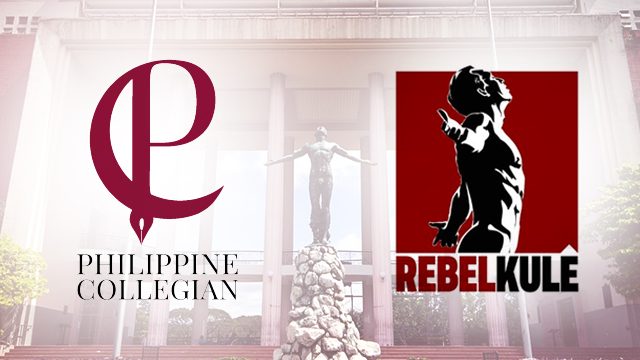SUMMARY
This is AI generated summarization, which may have errors. For context, always refer to the full article.

Editor’s note: An earlier version of this story had some inaccurate details that have been corrected in this updated story.
MANILA, Philippines – At the academically-liberal University of the Philippines in Diliman (UPD), there are two campus publications that each claim to be the school’s official newspaper: the Philippine Collegian and the Rebel Kule.
Rebel Kule has a history of being revived by campus journalists during turbulent times, like during Martial Law, when all student councils and publications were suppressed by the state.
For academic year 2018-2019, Rebel Kule has unfurled its masthead for the 4th time in UP history, but for a different reason.
Why are there two publications? It all started when two campus journalists of the Philippine Collegian were disqualified from the selection of the publication’s next editor in chief last May because they failed to meet residency requirements.
Many student organizations deemed it a serious press freedom issue, but UP Diliman Chancellor Michael Tan maintained that the decision was based on a clear set of rules with no precedents challenging it.
Tan, in an email to Rappler, also said Rebel Kule’s revival is a “student matter.”
“The Rebel Kule is an offshoot of the old [Collegian] staff insisting that the editorial exams were unfair. We have had numerous meetings about this, but they continue to reject the results,” Tan said in response to questions sent by Rappler.
What are the differences between the two? The editorial board of Rebel Kule is handling all the social media accounts of the Philippine Collegian, while the editorial board of the Philippine Collegian has created a new website to disseminate information.
Sheila Abarra, editor in chief of Rebel Kule, said it was the student body – through the 46th General Assembly of Student Councils and 2018 UP Solidaridad Congress – that released two resolutions to revive the publication, and the past editorial board of the Philippine Collegian heeded. The Rebel Kule was launched on September 6, and it released its first print copy to the UP community during the Martial Law anniversary on September 21.
Abarra said the editorial board of Rebel Kule – which is the past editorial board of the Philippine Collegian – is serving a holdover term.
She also underscored that being the official publication of the campus meant having the support of the students: “The administration recognizes the Philippine Collegian [as the official campus publication], but the Rebel Kule is recognized by the entire student body.”
Meanwhile, the new editor in chief of the Philippine Collegian is law student Edward “SJ” San Juan.
As of press time, San Juan’s name and position are not yet published on the UPD Office of Student Activities website. The latest name on the list of Philippine Collegian editors in chief is Sanny Boy Afable, who served during academic year 2017-2018.
Through the years, the Philippine Collegian featured news admittedly biased toward issues advocated by students, with focus on rallies, protests, and other injustices experienced by marginalized communities.
This year, San Juan said the Philippine Collegian will rebrand its reporting style.
“We will expose and oppose this administration’s problematic policies, but critically engage the good ones…. Our principal task is to guide the students, as our publishers and primary readers, to take a stand by reporting the truth, or at least the closest version of it,” San Juan wrote in an article about charting the Philippine Collegian’s editorial direction.
He added: “Thus, our bias will be balanced with the fair and accurate reporting of the news.”
Instead of keeping up with Philippine Collegian’s weekly print tradition, San Juan said the publication will be investing in digital media because that is where the readers are.
“The Philippine Collegian will produce neither grim-only pictures of social reality, nor churn out mere fads and passing fancies. We will report the truth, render a fair accounting of unfolding history, give incisive and scathing opinions to disturb the comfortable,” San Juan wrote.
How will the issue be resolved? Abarra said Rebel Kule will push for the review and amendment of Collegian rules, with the help of the Rebel Kule’s editorial board, the LCC, University Student Council, UP Solidaridad, and the Office of the Student Regent.
“I think that Rebel Kule serves as a wake-up call to the administration that students will not take things sitting down, and that the demands should be taken seriously,” UP journalism professor and former Philippine Collegian news editor Danilo Arao said in an interview with Rappler.
Arao, who was a former judge in the Philippine Collegian’s editorial exams, said that past judges were not as dogmatic and technical as the current board of judges.
According to him, campus press freedom is not just about providing institutional autonomy to campus publications; it is also about coming up with mechanisms that allow students to choose whom they think is the deserving editor.
Now that there are two UPD campus publications that both claim to represent the voice of the students, it is up to the UP administration to make clear its stand on how it sees campus press freedom, according to Arao. – Rappler.com
Angelica Y. Yang is a 4th year journalism student at UP Diliman. She is a former features writer for the Philippine Collegian.
Add a comment
How does this make you feel?
There are no comments yet. Add your comment to start the conversation.